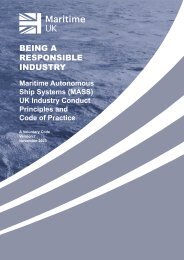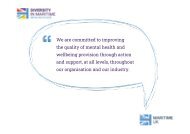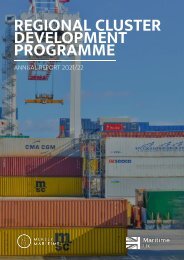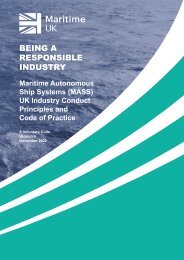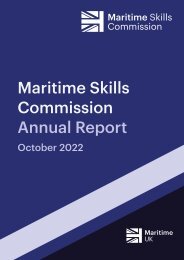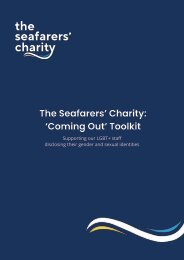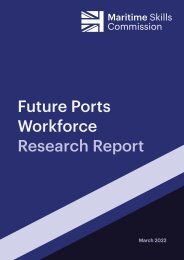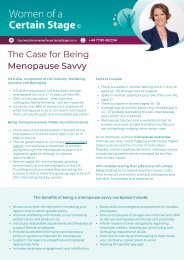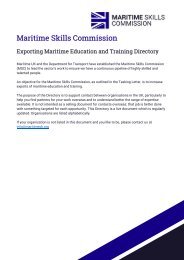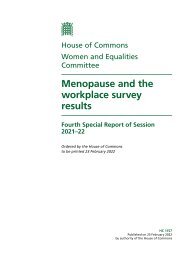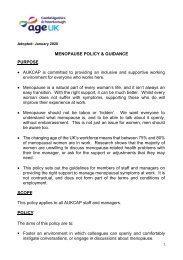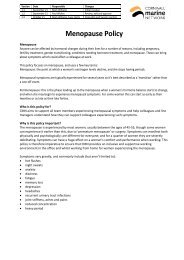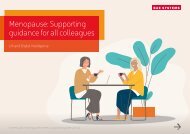Maritime Skills Commission - Skills for Green Jobs Position Paper - June 2022
Create successful ePaper yourself
Turn your PDF publications into a flip-book with our unique Google optimized e-Paper software.
<strong>Maritime</strong> <strong>Skills</strong><br />
<strong>Commission</strong><br />
<strong>Maritime</strong> <strong>Skills</strong><br />
<strong>Commission</strong><br />
<strong>Skills</strong> <strong>for</strong><br />
<strong>Green</strong> <strong>Jobs</strong><br />
<strong>Position</strong> <strong>Paper</strong><br />
<strong>June</strong> <strong>2022</strong>
<strong>Skills</strong> <strong>for</strong> <strong>Green</strong> <strong>Jobs</strong> <strong>Position</strong> <strong>Paper</strong> - 1<br />
Summary<br />
I am delighted to be launching the <strong>Maritime</strong> <strong>Skills</strong> <strong>Commission</strong>’s<br />
<strong>Skills</strong> <strong>for</strong> <strong>Green</strong> <strong>Jobs</strong> position paper.<br />
Along with other industries, the UK maritime sector has a responsibility<br />
to transition to net zero. Consequently, the sector has set itself<br />
ambitious targets and significant work is required to aid the transition.<br />
In order <strong>for</strong> this to be successful, it is necessary to understand the<br />
skills required to underpin the transition and to ensure that they can<br />
be appropriately delivered in order <strong>for</strong> the work<strong>for</strong>ce, both future and<br />
existing, to be skilled, reskilled and upskilled.<br />
Research has indicated that 1.7 million new and green full-time<br />
equivalent roles could be created by 2030, with at least 900,000 to<br />
1.3 million relating to energy efficiency and low-carbon heating<br />
(<strong>Green</strong>ing the Giants, Onward Think Tank). The remaining will be<br />
created through existing roles made greener; emphasising the need <strong>for</strong><br />
re-skilling and upskilling and the importance of the ability <strong>for</strong> workers<br />
to transfer from areas of decline.<br />
The <strong>Maritime</strong> <strong>Skills</strong> <strong>Commission</strong> has committed to ensuring the<br />
green jobs agenda is woven throughout all aspects of the <strong>Commission</strong>’s<br />
Scheme of Work. It will underpin all activities rather than being a<br />
defined activity in its own right. The <strong>Commission</strong> recognises that there<br />
is much still to do to understand the complexities and implications<br />
in the development of green jobs and the requirements <strong>for</strong> the<br />
appropriate skills. It will enhance its understanding by extending<br />
its consultation with different parts of the industry, identifying the<br />
challenges faced, solutions in place, the differing interpretations of<br />
green jobs and skills and proposed future activity.<br />
I would like to thank the <strong>Maritime</strong> UK National Council and <strong>Maritime</strong><br />
<strong>Skills</strong> <strong>Commission</strong>ers <strong>for</strong> their input into the paper and in particular<br />
Cornwall Marine Network, Artemis Technologies, Harland & Wolffe,<br />
Nautilus International and UK <strong>Green</strong> <strong>Skills</strong> Task<strong>for</strong>ce.<br />
Professor Graham Baldwin<br />
Chair <strong>Maritime</strong> <strong>Skills</strong> <strong>Commission</strong>
<strong>Skills</strong> <strong>for</strong> <strong>Green</strong> <strong>Jobs</strong> <strong>Position</strong> <strong>Paper</strong> - 3<br />
Current<br />
Evidence<br />
In July 2021, the <strong>Maritime</strong> <strong>Skills</strong> <strong>Commission</strong> held a<br />
The key findings included:<br />
first stage evidence-based session to discuss the<br />
meaning of green skills. Findings were presented from<br />
various sources including the UK <strong>Green</strong> <strong>Skills</strong> Task<strong>for</strong>ce<br />
and the Cornwall Marine Network.<br />
The findings in<strong>for</strong>med the next session,<br />
held at COP26, where delegates explored<br />
the following points:<br />
Will businesses need<br />
to reskill/retrain their<br />
work<strong>for</strong>ce to transition<br />
to net zero?<br />
Demand <strong>for</strong> green<br />
jobs is expected to be<br />
considerable, with some<br />
1.7million additional jobs<br />
to be required by 2030,<br />
a 400% increase.<br />
How are, or will, businesses<br />
reskill/retrain their work<strong>for</strong>ce<br />
to transition to net zero?<br />
What needs to happen<br />
<strong>for</strong> a business to reskill/<br />
retrain their work<strong>for</strong>ce?<br />
What support will<br />
businesses require to<br />
reskill/retrain the<br />
work<strong>for</strong>ce?<br />
What will be the biggest<br />
challenge in reskilling/<br />
retraining?<br />
The maritime sector faces<br />
considerable challenges in<br />
meeting the future demand<br />
<strong>for</strong> green jobs and putting<br />
in place the skills required.<br />
Demand <strong>for</strong> skills to<br />
support green jobs is a<br />
rapidly evolving situation,<br />
driven by policy, legislation,<br />
consumer behaviours
4 - <strong>Skills</strong> <strong>for</strong> <strong>Green</strong> <strong>Jobs</strong> <strong>Position</strong> <strong>Paper</strong><br />
and technological advances.<br />
The fast pace of change<br />
presents challenges<br />
<strong>for</strong> both employers and<br />
training and qualification<br />
providers.<br />
The green economy<br />
presents opportunities to<br />
attract new workers into<br />
the maritime sector and<br />
to develop and harness<br />
new skills-sets.<br />
The <strong>Maritime</strong> <strong>Skills</strong><br />
<strong>Commission</strong> has a key role<br />
to play in championing the<br />
skills required <strong>for</strong> green<br />
jobs in the sector and<br />
facilitating the responses<br />
of both industry and<br />
education and training<br />
providers.<br />
There is an urgent need<br />
<strong>for</strong> the maritime sector –<br />
at many levels and across<br />
each of the maritime<br />
sub-sectors – to respond<br />
to the pace of change<br />
as we move to the green<br />
economy.
<strong>Skills</strong> <strong>for</strong> <strong>Green</strong> <strong>Jobs</strong> <strong>Position</strong> <strong>Paper</strong> - 7<br />
<strong>Position</strong><br />
Statement<br />
The <strong>Maritime</strong> <strong>Skills</strong> <strong>Commission</strong> adopts<br />
the following definition of ‘green’ as:<br />
“the effective<br />
amalgamation of<br />
environmentally conscious<br />
knowledge, abilities,<br />
values, and attitudes<br />
to support a sustainable<br />
and resource-efficient<br />
maritime sector”<br />
This is further broken down into<br />
the following statements<br />
<strong>Jobs</strong>/<strong>Skills</strong> that are green by nature,<br />
such as conservationists and ecologists<br />
Key jobs/skills such as wind farm installation<br />
which have a green purpose but are redirecting<br />
previous engineering and construction skills<br />
Supporting skills such as communication and<br />
community engagement on green issues; and<br />
Supporting skills, needed to make a business<br />
“greener” to operate.<br />
Following the evidence gathering<br />
sessions and subsequent independent<br />
report based on the meeting at COP26,<br />
the following <strong>Commission</strong> actions have<br />
been agreed:<br />
Take ownership of the ‘skills<br />
to support green jobs’ agenda<br />
<strong>for</strong> the maritime sector by<br />
continuing to collaborate,<br />
learn, listen and work with key<br />
industry stakeholders.<br />
2<br />
Support <strong>Maritime</strong> UK’s<br />
recommendation <strong>for</strong> a <strong>Green</strong><br />
<strong>Skills</strong> tax credit.<br />
3<br />
Work closely with<br />
Government, Research and<br />
Development institutions,<br />
and sector representatives to<br />
foster a favourable context<br />
<strong>for</strong> infrastructure investment,<br />
technology readiness and<br />
work<strong>for</strong>ce development.
8 - <strong>Skills</strong> <strong>for</strong> <strong>Green</strong> <strong>Jobs</strong> <strong>Position</strong> <strong>Paper</strong><br />
4<br />
Support the calls <strong>for</strong><br />
Government-funded<br />
green-specific promotion of<br />
skills and jobs, along with<br />
wage subsidies <strong>for</strong> jobs<br />
contributing to the<br />
green transition.<br />
7<br />
Oversee the development<br />
and deployment of a<br />
comprehensive Matrix of<br />
<strong>Green</strong> jobs/skills in the<br />
sector.<br />
5<br />
Support organisations<br />
to promote the diversity<br />
in green jobs in the<br />
maritime sector.<br />
6<br />
Collaborate with<br />
Regional <strong>Maritime</strong><br />
Clusters and intermediary<br />
organisations to develop<br />
local ownership of the<br />
skills agenda whilst<br />
the <strong>Commission</strong> monitors<br />
the development and<br />
deployment of skills <strong>for</strong><br />
green jobs across the<br />
UK.
30 Park Street<br />
London<br />
SE1 9EQ<br />
020 7417 2837<br />
info@maritimeuk.org<br />
maritimeuk.org<br />
© Copyright <strong>Maritime</strong> UK <strong>2022</strong>




